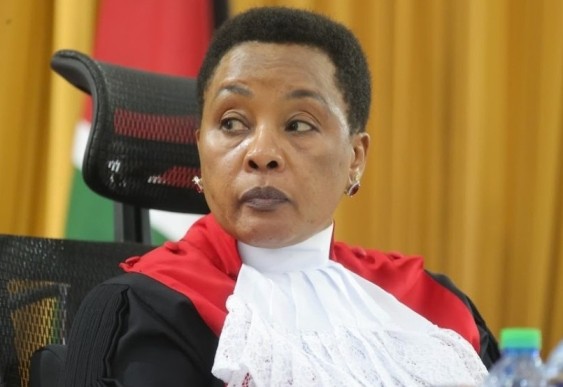JSC clears DCJ Mwilu in Gachagua impeachment petition

The JSC ruled that the petition did not meet the constitutional threshold for the removal of a judge under Article 168, which provides grounds such as incapacity and breach of the code of conduct
The Judicial Service Commission (JSC) has dismissed a petition seeking the removal of Deputy Chief Justice Philomena Mwilu over claims of gross misconduct in the handling of the impeachment case against former Deputy President Rigathi Gachagua.
The petition, lodged by Belinda Egesa, accused Mwilu of overstepping her mandate by unlawfully assigning judges to hear the matter, a role reserved for Chief Justice Martha Koome.
It also alleged incompetence, constitutional violations, and abuse of office.
However, the JSC ruled that the petition did not meet the constitutional threshold for the removal of a judge under Article 168, which provides grounds such as incapacity, breach of the code of conduct, bankruptcy, incompetence, or gross misconduct.
In a letter signed by Secretary Wilfridah Mokaya and addressed to Egesa’s lawyers, Bashir & Associates Advocates, the commission found no evidence that Mwilu acted in bad faith.
At the center of the dispute was Mwilu’s decision to assign Justices Erick Ogola, Anthony Mrima, and Freda Mugambi to preside over the Gachagua impeachment case.
While the Court of Appeal later held that the DCJ had exceeded her powers, the JSC concluded her actions were undertaken in good faith due to legal uncertainty on whether the Deputy Chief Justice could act in the Chief Justice’s stead.
The appellate court’s May 9, 2025 ruling confirmed that the law was ambiguous on this point, though it faulted Mwilu for improperly constituting the bench.
The JSC, however, emphasized that there was no proof of malice, misconduct, or deliberate violation of the law.
The contested case had been filed by three Kirinyaga residents at the High Court in Kerugoya, challenging both Gachagua’s removal and the swearing-in of Kithure Kindiki as his replacement.
The bench empanelled by Mwilu allowed Kindiki to take office, but the Court of Appeal later nullified the decision, declaring the bench improperly constituted since Mwilu lacked authority to exercise powers reserved for the Chief Justice under Article 165(4).
Following this ruling, Egesa petitioned the JSC to recommend Mwilu’s removal, arguing that her actions carried grave constitutional consequences.
Her lawyers maintained that, “The consequence of the unconstitutional conduct of the Deputy Chief Justice in improperly empanelling the bench of three judges resulted in the setting aside of conservatory orders in Kerugoya High Court, thus greenlighting the swearing-in of Prof Kindiki as the Deputy President replacing Mr Gachagua. These events cannot be practically reversed.”
They further claimed Mwilu had directly usurped the Chief Justice’s authority, insisting that the appellate court itself had held, “indubitably, we find and hold that there was no evidence that the Deputy Chief Justice was the acting Chief Justice or that there existed exceptional circumstances permitting her to exercise the mandate constitutionally reserved for the Chief Justice under Article 165(4).”
Despite these submissions, the JSC concluded that Mwilu’s actions arose from a genuine legal ambiguity rather than misconduct, and dismissed the petition for lack of merit.
